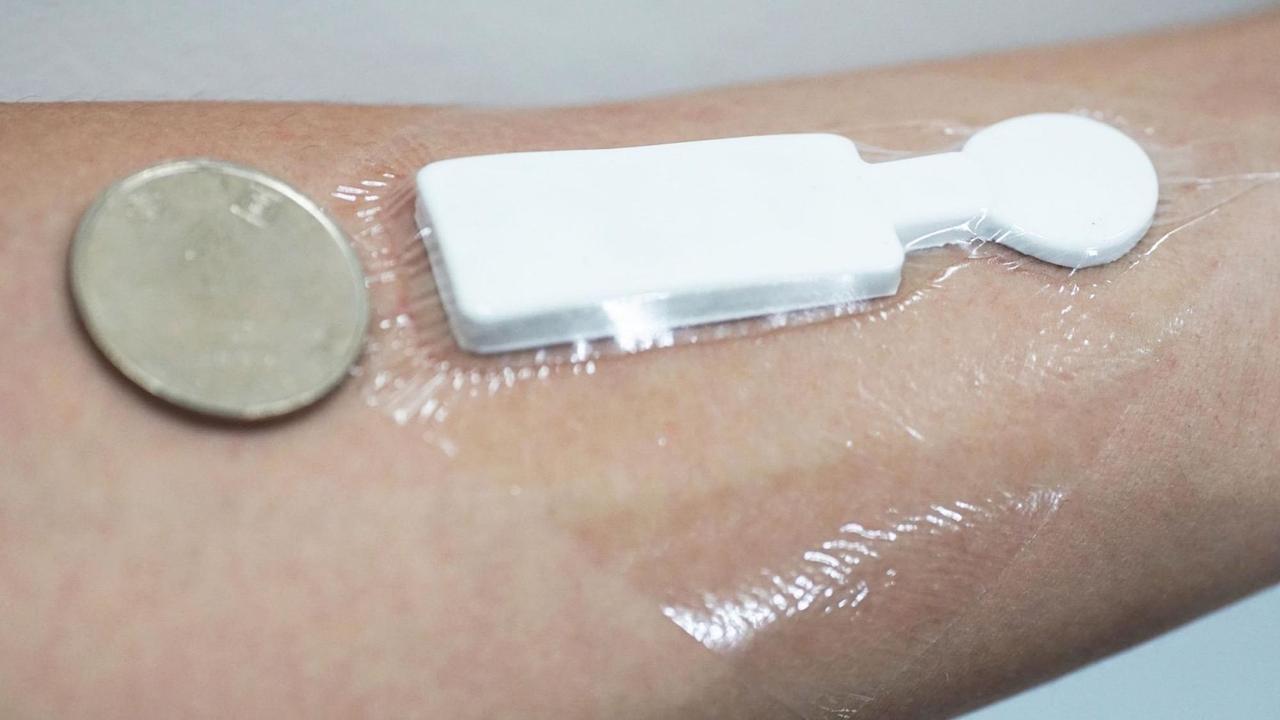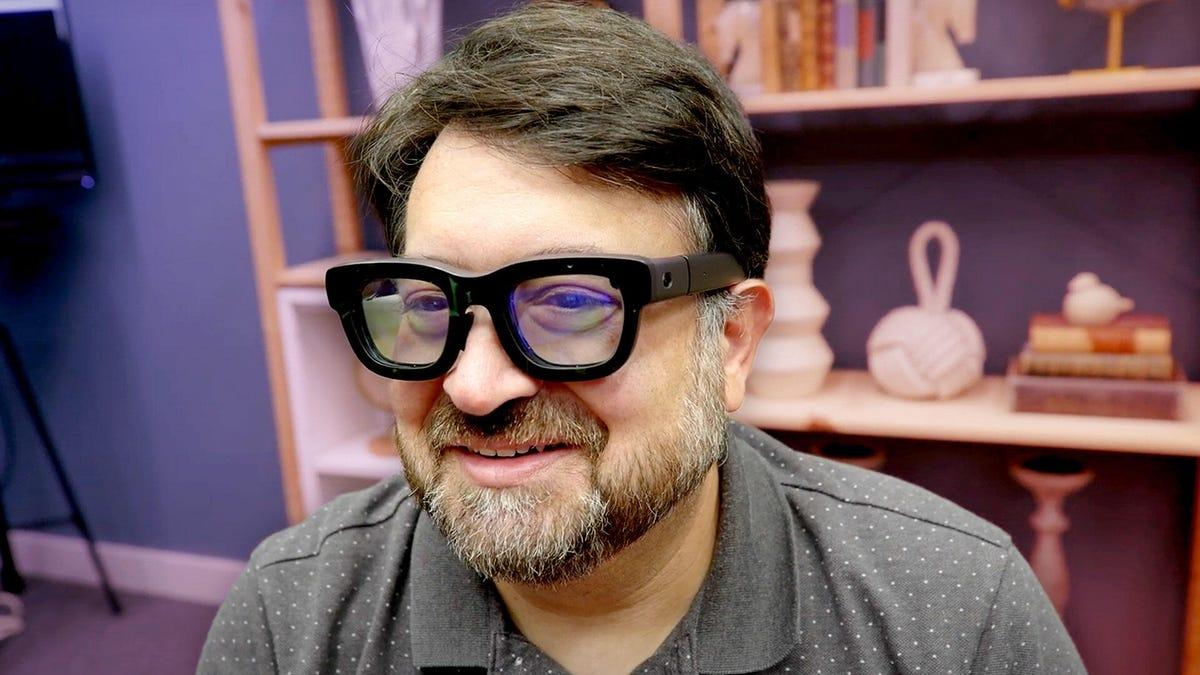Emteq Labs Unveils Emotion-Sensing Smart Glasses: A New Frontier in Health Wearables
2 Sources
2 Sources
[1]
Emteq Labs unveils smart glasses that track emotions and eating habits
Bottom line: As the field of smart eyewear continues to evolve, glasses that can sense emotions could open the door to more data-driven approaches to health, wellness, and human-computer interaction. However, it will be crucial to address privacy concerns before they move to widespread adoption. Emteq Labs has announced the development of Sense, which it says is the world's first emotion-sensing smart glasses. Sense glasses incorporate technology that sets them apart from conventional smart eyewear. At their core is Emteq's patented OCO sensors, which provide precise three-dimensional mapping of facial skin movements. The glasses also incorporate a 9-axis inertial measurement unit and an altimeter for behavioral understanding. A downward-facing camera logs food consumption, while proprietary AI/ML algorithms analyze collected data, which is transferred to a companion app and cloud platform. The glasses track various metrics, including facial expressions, eating habits, mood, posture, attention levels, and physical activity. Surgeon and facial musculature expert Dr. Charles Nduka leads the company, which has been immersed in engineering advanced technologies for sensing facial movements and emotions over the past decade. It says this data has never been available outside of a laboratory, healthcare facility, or other controlled setting. "Since founding Emteq Labs in 2015, we have been on a mission to improve lives and health outcomes through a deeper understanding of our emotional responses and behaviors," Nduka said. Emteq Labs envisions two primary applications for Sense glasses. One is mental health monitoring, as the technology can distinguish between depressed and non-depressed individuals. The other is dietary management. Sense glasses can detect chewing patterns and monitor food consumption, offering insights to prevent overeating. However, the glasses have the potential to enhance several fields. Because they can analyze real-time emotional responses, they would be useful in consumer research and augmented reality applications. Emteq Labs is headed by Steen Strand, who, before joining Emteq, led Snap's hardware division, SnapLab, where he was responsible for the Spectacles line of augmented reality eyewear and the company's hardware-related investments and acquisitions. "Emteq's technology will change how we understand ourselves and will create strong use cases that will soon drive the adoption of AR eyewear," Strand said. Privacy concerns will surely arise whenever these glasses are ultimately released - there is no set date yet - but Emteq Labs says that users have full control over their data and can choose whether to share it with healthcare professionals or researchers. However, experts warn about potential misuse, especially in regions where governments might exploit such data for surveillance or oppression of certain communities. And some say it is just a bad idea. "Where do we go from here?" Avijit Ghosh, an applied policy researcher at the AI company Hugging Face, told Wired. "Emotion detection becoming mainstream without discussing the pitfalls and taking away human agency, forcing this sort of normative idea of what proper emotions should be, is like a path to doom." Meanwhile, Emteq Labs is facing competition from tech giants like Meta and Apple, who are also developing smart glasses with various features. To remain competitive, Emteq may need to incorporate features besides emotion detection. The company plans to release a development kit for commercial partners in December, opening up possibilities for a wide range of applications across different industries.
[2]
Emteq Labs Unveils World's First Emotion-Sensing Eyewear
Emteq Labs, has introduced of Sense, the world's first emotion-sensing eyewear. Designed to change how people understand and improve their health, this cutting-edge eyewear platform offers lab-quality insights in real-time, outside of controlled environments. Emteq Labs, under the visionary leadership of Dr. Charles Nduka, has been pushing the boundaries of AI-powered emotional and behavioral analysis for years. Now, with the introduction of Sense, users can monitor and analyze their emotions, facial expressions, dietary habits, posture, physical activity, and more -- all through a seamless and wearable solution. In addition to launching Sense, Emteq Labs has appointed Steen Strand as the new CEO. Strand, former head of Snap Inc.'s hardware division, brings a wealth of experience in consumer products and augmented reality, positioning Emteq to lead the smart eyewear market. With applications spanning health, fitness, augmented reality (AR), mental health, and beyond, Sense eyewear is set to transform how wearables contribute to health and well-being. Emteq Labs' Sense eyewear represents a major breakthrough in the field of health wearables. Using advanced AI and machine learning algorithms, Sense captures real-time data on facial movements, mood, and behaviors through specialized sensors embedded in the glasses. These sensors, called OCO sensors, are able to detect subtle muscle movements around key facial points, allowing for accurate emotion and facial expression recognition. In addition, the glasses come equipped with a downward-facing camera to log food consumption, enabling users to automatically track their dietary habits. This data is processed through proprietary AI/ML models and securely stored in the Sense app, where users have full control over their information. They can choose to share their insights with healthcare providers, trainers, or researchers if they wish, but otherwise, their data remains private. By enabling users to monitor their emotions, attention levels, physical activity, and dietary habits, Sense offers a comprehensive tool to improve overall well-being, promote weight management, and support mental health. Sense is designed to have applications far beyond personal health. By capturing data on emotional and behavioral responses in everyday settings, the technology opens up possibilities for new AR experiences, improved mental health diagnostics, and even consumer sentiment analysis. The introduction of Sense is underpinned by years of scientific research and clinical validation. Emteq Labs has collaborated with healthcare institutions to study how facial movements and emotions can serve as key indicators of physical and mental health. For instance, a study published in the Journal of Medical Internal Research highlighted the eyewear's effectiveness in tracking eating behaviors without the need for manual food logging, a significant advancement over traditional self-reporting methods. Furthermore, Emteq's technology has shown promise in mental health applications. Research published in the journal Frontiers in Psychiatry demonstrated that Sense could reliably distinguish between individuals with and without depression based on their emotional and facial behaviors. This opens up new possibilities for remote diagnostics and continuous monitoring of mental health conditions like anxiety, depression, and even neurological conditions like autism spectrum disorder. The ability to capture such detailed health data in everyday environments is a game-changer. It means that healthcare professionals can gain better insights into a patient's day-to-day experiences, potentially leading to earlier interventions, more personalized treatment plans, and improved outcomes for conditions that are often difficult to monitor outside of clinical settings. The appointment of Steen Strand as CEO marks a pivotal moment for Emteq Labs. Having led Snap Inc.'s hardware division and overseen the development of Spectacles AR eyewear, Strand's experience in merging consumer products with cutting-edge technology is expected to drive the next phase of growth for Emteq. Strand brings a deep understanding of the consumer wearables market, particularly in the areas of augmented reality and health technology, making him uniquely positioned to steer Emteq into the future. Strand emphasized the potential of Emteq's technology to transform not only the smart eyewear space but also broader health and wellness industries. "Eyewear is the next frontier in health wearables," he stated, noting that the seamless integration of advanced sensors and AI-driven analysis could make Sense the most compelling use case for smart glasses to date. Under Strand's leadership, Emteq plans to expand the use of Sense beyond individual consumers. The company will offer its development kit to commercial partners, allowing them to explore applications in healthcare, AR, fitness, and even marketing. These partnerships will begin in December, marking the start of a new era where emotion-sensing eyewear plays a critical role in enhancing both physical and mental well-being. Emteq Labs has already established itself as a leader in wearable technology, and with the introduction of Sense, it is poised to set a new standard for what health wearables can achieve. As the world moves toward greater integration of AI and wearables in everyday life, Emteq's innovative approach could soon become the benchmark for next-generation smart eyewear. Here are a selection of other articles from our extensive library of content you may find of interest on the subject of smart glasses :
Share
Share
Copy Link
Emteq Labs introduces Sense, the world's first emotion-sensing smart glasses, offering real-time insights into emotions, facial expressions, and eating habits. This AI-powered eyewear aims to revolutionize health monitoring and human-computer interaction.

Emteq Labs Introduces Groundbreaking Emotion-Sensing Eyewear
Emteq Labs has unveiled Sense, touted as the world's first emotion-sensing smart glasses, marking a significant advancement in wearable technology. These innovative glasses incorporate AI-powered sensors to track emotions, facial expressions, eating habits, and various other metrics in real-time
1
.Advanced Technology and Features
At the core of Sense glasses are Emteq's patented OCO sensors, which provide precise three-dimensional mapping of facial skin movements. The eyewear also includes:
- A 9-axis inertial measurement unit and altimeter for behavioral understanding
- A downward-facing camera to log food consumption
- Proprietary AI/ML algorithms for data analysis
- A companion app and cloud platform for data transfer and storage
1
Applications and Potential Impact
Emteq Labs envisions two primary applications for Sense glasses:
- Mental health monitoring: The technology can distinguish between depressed and non-depressed individuals.
- Dietary management: Sense glasses can detect chewing patterns and monitor food consumption, offering insights to prevent overeating
1
.
Beyond these, the glasses have potential applications in consumer research, augmented reality, and various health-related fields. The ability to capture detailed health data in everyday environments could lead to earlier interventions, more personalized treatment plans, and improved outcomes for conditions that are often difficult to monitor outside clinical settings
2
.Leadership and Vision
Dr. Charles Nduka, a surgeon and facial musculature expert, leads Emteq Labs. The company has recently appointed Steen Strand, former head of Snap Inc.'s hardware division, as its new CEO. Strand's experience in consumer products and augmented reality is expected to drive Emteq's growth in the smart eyewear market
2
.Scientific Backing and Research
Emteq Labs' technology is supported by years of scientific research and clinical validation. Studies published in the Journal of Medical Internal Research and Frontiers in Psychiatry have demonstrated the effectiveness of the eyewear in tracking eating behaviors and distinguishing between individuals with and without depression
2
.Related Stories
Future Plans and Challenges
Emteq Labs plans to release a development kit for commercial partners in December, opening up possibilities for a wide range of applications across different industries. However, the company faces competition from tech giants like Meta and Apple, who are also developing smart glasses with various features
1
.Privacy Concerns and Ethical Considerations
While Emteq Labs assures that users have full control over their data, privacy concerns are likely to arise. Experts warn about potential misuse, especially in regions where governments might exploit such data for surveillance or oppression. The mainstream adoption of emotion detection technology without addressing potential pitfalls has also been criticized by some researchers
1
.References
Summarized by
Navi
[2]
Related Stories
Revolutionary Emotion-Sensing Sticker Unveils True Feelings, Promising Advancements in Mental Health Care
22 Apr 2025•Science and Research

Harvard Dropouts Launch Controversial 'Always-On' AI Smart Glasses
21 Aug 2025•Technology

Looktech AI Glasses: Revolutionizing Wearable Tech with Advanced AI Integration
12 Dec 2024•Technology

Recent Highlights
1
ByteDance Faces Hollywood Backlash After Seedance 2.0 Creates Unauthorized Celebrity Deepfakes
Technology

2
Microsoft AI chief predicts artificial intelligence will automate most white-collar jobs in 18 months
Business and Economy

3
Google reports state-sponsored hackers exploit Gemini AI across all stages of cyberattacks
Technology





